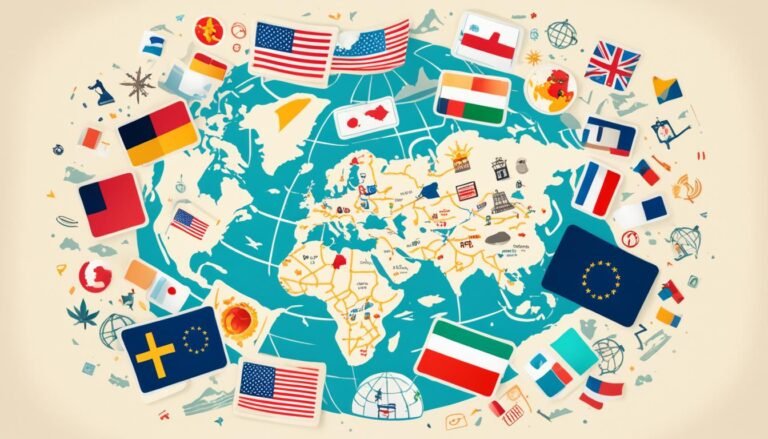Navigating Cultural Differences: A Guide for Digital Nomads
Remote work and digital nomadism are on the rise. This means understanding cultural differences is key for success. Digital nomads work remotely in different places without a fixed home. This guide will show why cultural awareness is important and give tips for working in various cultures.
The digital nomad lifestyle is full of chances for growth. It lets you see new cultures and meet people from all over. For instance, places like Portugal and Spain have special visas for digital nomads. This makes it easier for remote workers to live and work there while enjoying the culture.
This lifestyle fits well with jobs like web development, graphic design, and digital marketing. It lets you make money and see the world. But, it’s important to research your destinations well and travel responsibly. Knowing the local customs and laws helps you get along and make good friends wherever you go.
Key Takeaways
- Digital nomads need to understand cultural differences to do well when working abroad.
- Countries like Spain and Portugal have special visas for digital nomads.
- Good jobs for digital nomads include web development, graphic design, and digital marketing.
- Doing your homework and traveling responsibly is key for making good connections in new places.
- Embracing different cultures can boost your creativity and innovation.
The Importance of Cultural Awareness for Digital Nomads
For digital nomads, understanding and embracing cultural awareness is key. They move through different places and communities. Their ability to handle various cultures is crucial for fitting in and doing well in their work.
Understanding Cultural Etiquette
Adjusting to local ways is more than just being polite. It’s key to making real connections. Tips on cultural etiquette, like learning about customs before you go, help a lot. Knowing how to read non-verbal signals, like facial expressions and body language, makes talking to people easier.
Even a little bit of the local language can help digital nomads communicate better and show respect. It’s a strong way to connect with people, often leading to deeper friendships.
Importance of Respect and Sensitivity
Respect and sensitivity are at the heart of cultural immersion. By living in a new culture, digital nomads can understand its details and traditions. This experience builds empathy and tolerance, helping them fit in better.
Volunteering is a great way to get to know a culture. It shows a desire to help and respect others. Digital nomads should also be aware of cultural differences in business. Knowing these can help them avoid misunderstandings.
Putting a focus on cultural awareness helps everyone feel included and avoids problems. In new places, respecting local ways and planning ahead can reduce risks. It shows cultural sensitivity and helps build a world where everyone understands and gets along.
Strategies for Cross-Cultural Communication
For digital nomads, understanding cultural differences is key. Being able to communicate well across cultures is vital. It can make or break both work and personal experiences when you move around the world. While it might seem hard, knowing the common barriers and using strategic tips can really help improve how you connect with others.
Common Communication Barriers
Digital nomads often face challenges like language differences, time zone issues, and cultural misunderstandings. Language is a big challenge since not everyone speaks English well. Time zone differences can also cause problems, making it hard to schedule meetings and communicate.
Cultural differences add more complexity. It’s important to know about body language, gestures, and social rules. You also need to be able to adapt how you communicate to fit different people.
Tips for Effective Cross-Cultural Communication
To overcome these cultural gaps, digital nomads can use some practical tips:
- Learn Basic Local Phrases: Learning simple phrases in the local language is key. It helps connect with people and get past cultural differences.
- Practice Active Listening: Being a good listener is crucial. It means paying full attention and understanding the cultural background of the conversation.
- Leverage Digital Tools: Apps that help with language learning and translation can make communication easier. They offer real-time translation and work offline.
- Research Cultural Norms: It’s important to learn and respect local customs and social rules. Most digital nomads say understanding etiquette helps make positive connections.
- Maintain Professionalism: Being professional is key. Most digital nomads believe it’s important for success in global work settings.
- Adapt with Flexibility: Being open and flexible helps you adjust to different cultures. It makes communication across cultures better.
By using these strategies, digital nomads can better navigate through different cultures. This improves both their work and travel experiences.
Adapting to New Cultures While Working Remotely
Adapting to new cultures while working remotely is key for digital nomads. It helps them grow personally and professionally. Learning about different cultures and being flexible with remote work makes it easier to fit in.
Building Local Connections
Connecting with locals makes adapting to new cultures better. Digital nomads can join in on cultural activities through WeGoTrip. This includes workshops, festivals, and volunteering. 87% of them value balancing work and life, showing how important it is to connect with the culture.
- WeGoTrip helps by getting people involved in local events. This builds understanding and personal growth.
- Language learning sites like Lingoda help learn new languages. This closes communication gaps and deepens cultural knowledge.
Navigating Local Work Environments
Being able to adapt to different work settings is key. Teemyco Virtual Office lets digital nomads get used to the local way of life before they arrive. SEARADAR shares tips on local transport, helping nomads have real talks with locals.
73% of digital nomads say it’s vital to improve remote work skills for good teamwork. By adjusting to new work settings, they boost their careers and help the local community.
- Teemyco Virtual Office helps get used to local customs and daily life, making the move smoother.
- Tiqets gives insights into unique local spots. This enriches the experience by offering real, off-the-beaten-path experiences.
Cultural Sensitivity in Global Work Environments
As digital nomadism grows, so does the need for cultural sensitivity. It’s key for working well with people from all over the world. Cultural sensitivity helps bridge cultural gaps and improve work relationships.
Understanding and respecting local customs is a big part of cultural sensitivity. It builds trust and prevents misunderstandings. Knowing a little of the local language also helps connect with people.
It’s also important to watch and follow local ways of doing things. This shows respect and helps everyone get along better.
Working in different time zones requires cultural sensitivity too. Digital nomads need to adjust to these changes. Skills and output-based hiring focuses on motivation and digital skills.
The job market now draws from a global pool of talent. This brings in new skills and experiences. Cultural sensitivity is key in hiring to make sure everyone fits well.
Flexible work and creative pay options, like co-working memberships and travel perks, attract job seekers. They help balance work and life.
Being tech-savvy is a must for digital nomads. Companies that welcome digital nomads are seen as modern and appealing. This makes them more attractive to job seekers.
In short, cultural sensitivity and good remote work manners are crucial for success worldwide. They lead to better relationships and fewer misunderstandings. This makes the workplace more inclusive and harmonious.
Enhancing Creativity and Innovation Through Cultural Diversity
In today’s world, embracing cultural diversity is key for boosting creativity and innovation. Digital nomads, especially Generation Z, lead this change. They’re making traditional work settings more creative.
Exposure to New Perspectives
Digital nomads get to see different cultures, sparking new ideas. Generation Z loves experiences over routine. They choose places like Chiang Mai or Ubud for their vibrant culture.
These places inspire new ways of thinking. By connecting with local communities, digital nomads learn new things. This helps them create unique and innovative projects.
Collaborating with Diverse Teams
Working with people from various cultures improves problem-solving and boosts innovation through diversity. Tools like Slack and Zoom help global teams work together smoothly. Digital nomads can work from anywhere.
Spaces like Hubud in Ubud and Punspace in Chiang Mai are perfect for creativity. They bring together professionals and entrepreneurs. This leads to exciting new projects and ventures.
Generation Z digital nomads also focus on a good work-life balance. Cities like Chiang Mai offer a great setting for work and life. They’re sustainable, offer wellness options, and are affordable.
This mix of diverse minds and a great work environment shows how creative digital nomadism drives innovation through diversity.
Fostering a Global Network
For digital nomads, building a global network is key. It helps them grow their careers, learn new things, and overcome the challenges of living on the move. This part talks about how to make professional connections and use online groups to build a strong network worldwide.
Building Professional Relationships
For digital nomads, making strong professional connections is crucial. Being part of global networking events can lead to new partnerships and career growth. Here are some steps to make lasting professional ties:
- Attend Conferences and Meetups: Going to conferences and meetups lets you meet people who think like you and grow your network.
- Join Professional Associations: Being in professional groups gives you access to networking events, resources, and insights.
- Engage on Social Platforms: Use LinkedIn to connect with others, join groups, and share news in your field.
- Be a Resource: Helping others with advice and support can help you build strong professional relationships.
Leveraging Online Communities
Online communities for digital nomads provide support and a sense of belonging. They are key for getting resources, sharing stories, and building a worldwide network. Here’s why joining these communities is good:
- Networking Opportunities: These communities help nomads connect, leading to business partnerships and collaborations.
- Emotional Support: Sharing stories with others who get the nomadic life can offer emotional and moral support.
- Skill Enhancement: You can learn from webinars, workshops, and others in the community to improve your skills.
- Local Insights: Members often share tips and advice on living in new places, making it easier to settle in.
Places like Bali, Chiang Mai, and Lisbon are great for remote workers. They offer strong community support and a good quality of life. These spots show how important a connected global network is.
In summary, using global networking and joining digital nomad communities can greatly improve your personal and professional life. It opens up many opportunities and support.
Managing Cultural Shocks and Adjustments
Being a digital nomad means more than just working from different countries with your laptop and smartphone. It also means dealing with the mental effects of new cultures and the challenges of adjusting to them. Digital nomads and expats often face culture shock, whether it’s getting used to local customs or dealing with local rules.
“My own experiences in the Americas, Europe, and Asia have shown me how diverse and rich cultural encounters can be,” says the author, reflecting on their global journey.
Here are some tips to help you manage culture shock and adjust better:
- Prioritize Research: Learn about the cultural norms and etiquette of your new place before you go. This can prevent misunderstandings and help you make good connections.
- Build a Support Network: Join online communities or local groups for expats and digital nomads. Having people to talk to can make the emotional ups and downs easier to handle.
- Stay Open-Minded: Accept the differences you find. Being open can turn culture shocks into valuable learning moments.
Digital nomads often struggle with things like unreliable internet and keeping work and life balanced. Expats, on the other hand, face long-term challenges like adapting to local rules and building new social circles. But, with the right approach, these challenges can be overcome. For example, expats might find comfort in clubs for expats, international schools, and social groups, which help them settle into their new life.
Knowing the cultural details of a new place is key. For example, in Suzhou, China, the author had to be careful when talking about sensitive topics like Tiananmen, Tibet, and Taiwan to avoid upsetting people. In Korea, understanding the importance of hierarchy was crucial for both work and social life. These stories show that getting over culture shock is about learning and respecting different cultures all the time.
Whether you’re a digital nomad or an expat, adjusting to a new culture is an ongoing process. Facing these challenges can make your life richer and broaden your view, making your nomadic life more fulfilling.
Conclusion
Living the digital nomad life means exploring cultures from all over the world. This article looked at key points for dealing with cultural differences. It showed how important it is to understand different cultures.
Digital nomads grow personally and help build a more inclusive world by being culturally aware. They learn about local customs and how to communicate across cultures. This helps them connect with people from different backgrounds.
They also join online communities and make friends locally. This support is key for both personal and career growth. The digital nomad community is growing fast, with Americans leading the way. This shows how popular this lifestyle is becoming.
Handling cultural differences makes the digital nomad life richer. It brings new ideas and ways to stay safe online. With an open mind, embracing these differences leads to a rewarding remote work life.
Source Links
- What Is a Digital Nomad? (And Would You Be a Good One?)
- The employer’s guide to managing digital nomads
- Your Guide to Digital Nomad Visas Around the World – doola: Start your dream US business and keep it 100% compliant
- A Guide to Handling Emergencies – Jorcus
- A Digital Nomad’s Guide to Healthy Eating: Exploring Local Cuisines Around the World | ConnectPls
- Navigating Cultural Etiquette for Digital Nomads
- The 10 Proven Strategies to Overcome Language Barriers as a Digital Nomad
- The Impact Of Cultural Diversity On Digital Nomad Life – Liberty Nomads
- Digital Nomad’s Handbook: Navigating Remote Work with Confidence
- How to Respect and Adapt to Different Cultures as a Digital Nomad
- Cultural Sensitivity in Digital Nomad Travel – RemoteTeamer.com
- Everything you need to know about digital nomads: Should you hire them?
- The Future of Work: Gen Z and the Digital Nomad Lifestyle | Business
- Unleashing Purpose—A Digital Nomad’s Guide to Volunteering in Asia
- Embracing The Digital Nomad Lifestyle (Fall 2023)
- A Comprehensive Guide to Embracing a Location-Independent Lifestyle
- The Best Digital Nomad Communities for Remote Workers
- Digital Nomad Mastery—Navigating Culture Shock and Language Barriers in Asia with These Expert…
- Nomad vs. Expat: Understanding the Differences – Nomad Veronica
- Dealing With Culture Shock While Teaching English in China
- Trusting Your Instincts: A Digital Nomad’s Guide to Navigating Safety and Comfort in Unfamiliar Territories | ConnectPls
- Digital Nomad? – What is It An Ultimate Guide | Global Squirrels
- Navigating the Digital Nomad Lifestyle vs. Traditional US Living | ShaneWebGuy







